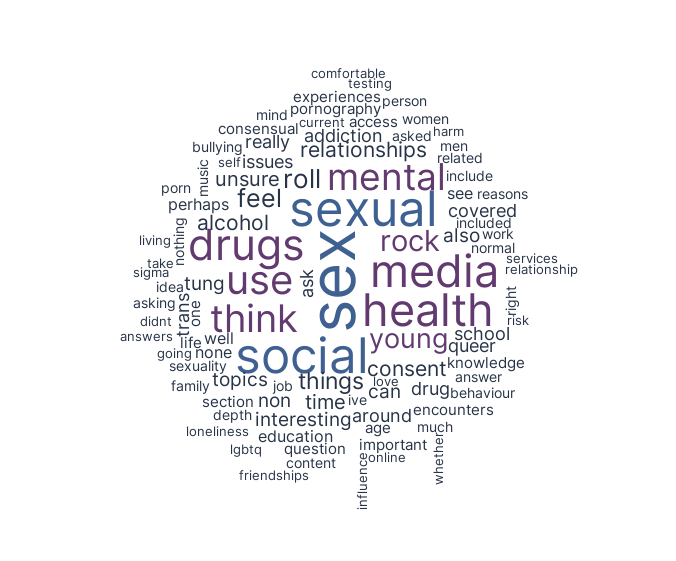
2025 Sex, Drugs and Rock 'n' Roll survey results
In 2025, we conducted our annual Sex, Drugs, and Rock ‘n’ Roll survey. From May to June, 1049 young people aged 15 to 29 completed the online survey.
We asked them about their knowledge of sexual health and sexual health preferences. We also asked about sexual behaviours, pornography use, and alcohol and other drug use.
Our findings are summarised below.
Participant demographics
The average age was 22 years.
General demographics
- 89% were born in Australia.
- 58% were currently studying at high school, university, or TAFE.
- 58% lived with their parent/s.
Gender
Participants could choose more than one option.
- 58% identified as a woman.
- 30% identified as a man.
- 14% identified as non-binary.
Sexual identity
Participants could select multiple options for sexual identity.
- 39% identified as heterosexual.
- 31% identified as bisexual.
- 16% identified as queer.
- 12% identified as gay.
2025 topics
Sexual health
We asked participants questions about STIs and sexual health. On average, participants answered 4 out of 6 questions correctly.
- 75% of participants knew that people infected with STIs do not always have symptoms.
- 81% of participants knew that if left untreated, chlamydia can last for years.
- 56% of participants knew that chlamydia can be diagnosed by a urine test.
- 62% of participants knew that taking the pill when young does not reduce fertility.
- 67% of participants knew that gonorrhoea, syphilis and chlamydia can all be treated with antibiotics.
- 50% of participants knew that chlamydia can make women infertile.
Education topics received at school
According to participants, these are the most-covered topics at school. Percentages refer to those who said the topic was covered well:
- consent education: 42%
- contraception: 39%
- menstrual cycle: 34%.
The least-covered topics at school. Percentages refer to those who said the topic wasn't covered:
- types of sex: 84%
- abnormal period symptoms: 81%
- sexual pleasure: 77%.
Menstrual health
60% of participants (666 people) reported having a menstrual period in the past 6 months.
Period products used by young people
Plain text list below chart.
- Disposable pads: 76%
- Tampons without applicator: 45%
- Period undies: 42%
- Panty liner: 27%
- Toilet paper: 16%
- Regular undies: 15%
- Period cup: 12%
- Tampons with applicator: 8%
- Reusable pads: 4%.
Vaping and e-cigarettes
- 62.7% of young people had used e-cigarettes
- curiosity (63%) and peer influence (52%) are two most cited reasons for starting to vape.
We also asked how harmful e-cigarettes/vapes are on a scale of 0 to 100.
- 89 was the average score.

Alcohol and other drugs
- 95% of participants had drunk alcohol in the past year
- 72% had ever used recreational drugs (illicit or non-prescribed)
- 45% had used recreational drugs in the past month
- 13% have ever had alcohol delivery to their home.
The most common recreational drugs participants have ever used are as follows (participants could select multiple options):
- Marijuana: 68%
- MDMA: 34%
- LSD: 34%
- Ketamine: 30%
- Cocaine: 30%.
Social media laws
Regarding this statement:
- 55% of participants agree
- 42% of participants disagree.
Topics for next year
Participants offered many words and suggestions regarding:
- social media
- drug use
- sexual health
- sex
- mental health
- consent and relationships
- pornography addiction.

More information
The study team thanks the young people who took part in this survey.
To discuss concerns from these results, please use the services below:
Project contacts
Project team

Ana Orozco
Research Assistant




